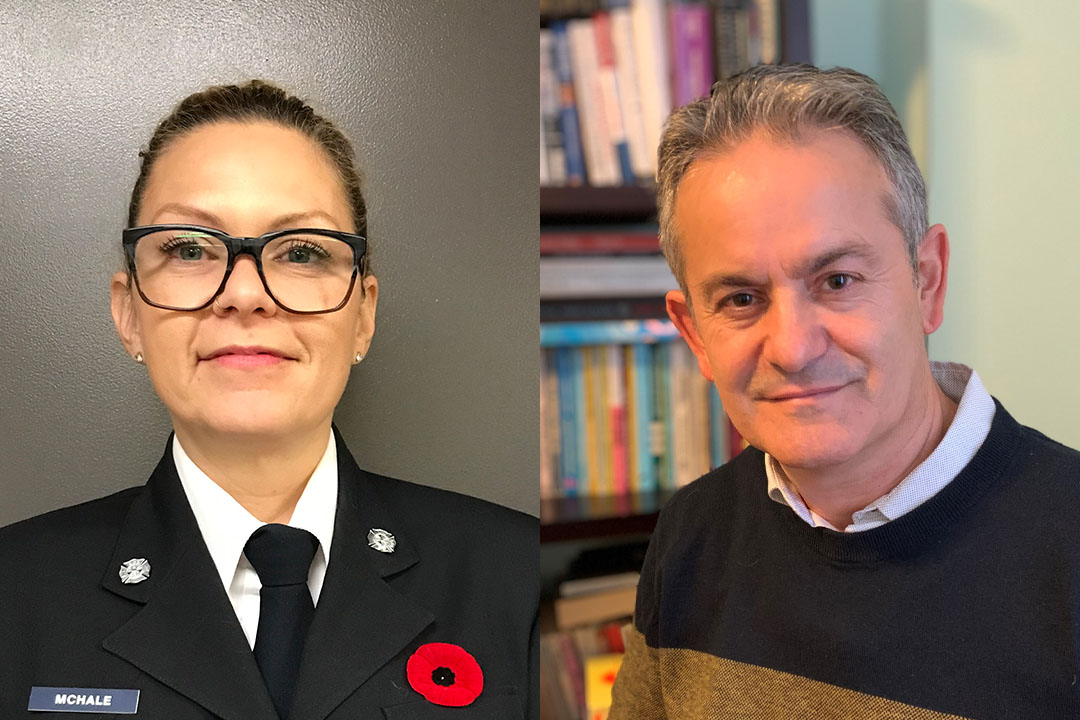
USask, City of Saskatoon partner to fight housing insecurity
A joint project between USask researchers and members of the Saskatoon Fire Department is looking to develop top-down solutions to issues of housing insecurity and homelessness for Saskatoon residents.
Dr. Nazmi Sari (PhD), the department head of Economics in USask’s College of Arts and Science, is working with Melissa McHale from the Saskatoon Fire Department’s Fire Bylaw Enforcement division on this project. Their aim is to learn more about any gaps in social services provided and the bylaws enacted by the city in order to create more preventative systems to fight housing insecurity and homelessness in the future.
McHale said the fire department is responsible for enforcing bylaws to close unsafe buildings for a variety of reasons. And while closing buildings is done for safety reasons, the result can still mean displacing residents from their homes.
“If we deem a house to be uninhabitable, as a last resort, we’ll issue a notice of closure on a house. We’ve had to do that where there’s people, family, pets living in the houses,” McHale said. “With this research project, we thought it would be beneficial … looking into why was this house closed in the first place? Often when we’re stepping in and closing a house, the problem didn’t appear overnight.”
Sari echoed those sentiments, noting there are a number of “good-willed” policies in municipalities that inadvertently have unintended and undesired consequences.
In addition to addressing frontline policies, this research will also examine economic policies – or lack thereof – around housing supports. With the COVID-19 pandemic contributing to high inflation and instability in the labour market, Sari said it’s more important than ever to address the factors contributing to homelessness.
“If you look at financial policies by the local, provincial, or federal government, there are not enough of those things. They are inadequate,” he said. “There are policies out there I hope that this project will help us to identify the right type of policies, or go over the policies we have and identify which are the best ones, or which are somewhat working and how we need to modify them.”
Sari and McHale will survey fire inspectors, investigators and bylaw enforcement inspectors, as well as examine currently existing policies, to gain a better understanding of how current bylaws are helping or hindering housing and homelessness in the city.
McHale said most of the services in place for assisting with homeless in Saskatoon tend to be “reactionary,” and her hope with this research is to develop tools that will be more proactive.
Understanding more of the circumstances that lead to homelessness, McHale said, could help city workers and associated services find ways to intervene before the final result of homelessness.
If this project leads to more resources and training for the city’s inspectors, McHale said it would be a success.
“Even just more organizations collaborating together," McHale said. “Just identifying some of those gaps or maybe how people fall through the cracks, anything that we could do or recommendations we could make to other agencies to prevent this problem before it gets there.”
Sari said working with McHale and the fire department on this research has been a rewarding experience. He lauded the city and the fire department for taking ownership of the issue of homelessness in Saskatoon.
“Having the city on the same page, interested and willing to work with and consider revising their policies, it’s a great experience because you feel your research has some potential to contribute to policy,” Sari said. “That means giving back to the community, and that is the most important thing as a researcher, as a (USask) member.”
This project is one of three recently awarded funding by the Research Junction initiative. Research Junction is a collaboration between the City of Saskatoon and USask’s Research Acceleration and Strategic Initiatives “to support the development of joint research projects that address contemporary urban issues for the benefit of Saskatoon residents.”
Together, we will undertake the research the world needs. We invite you to join by supporting critical research at USask.

